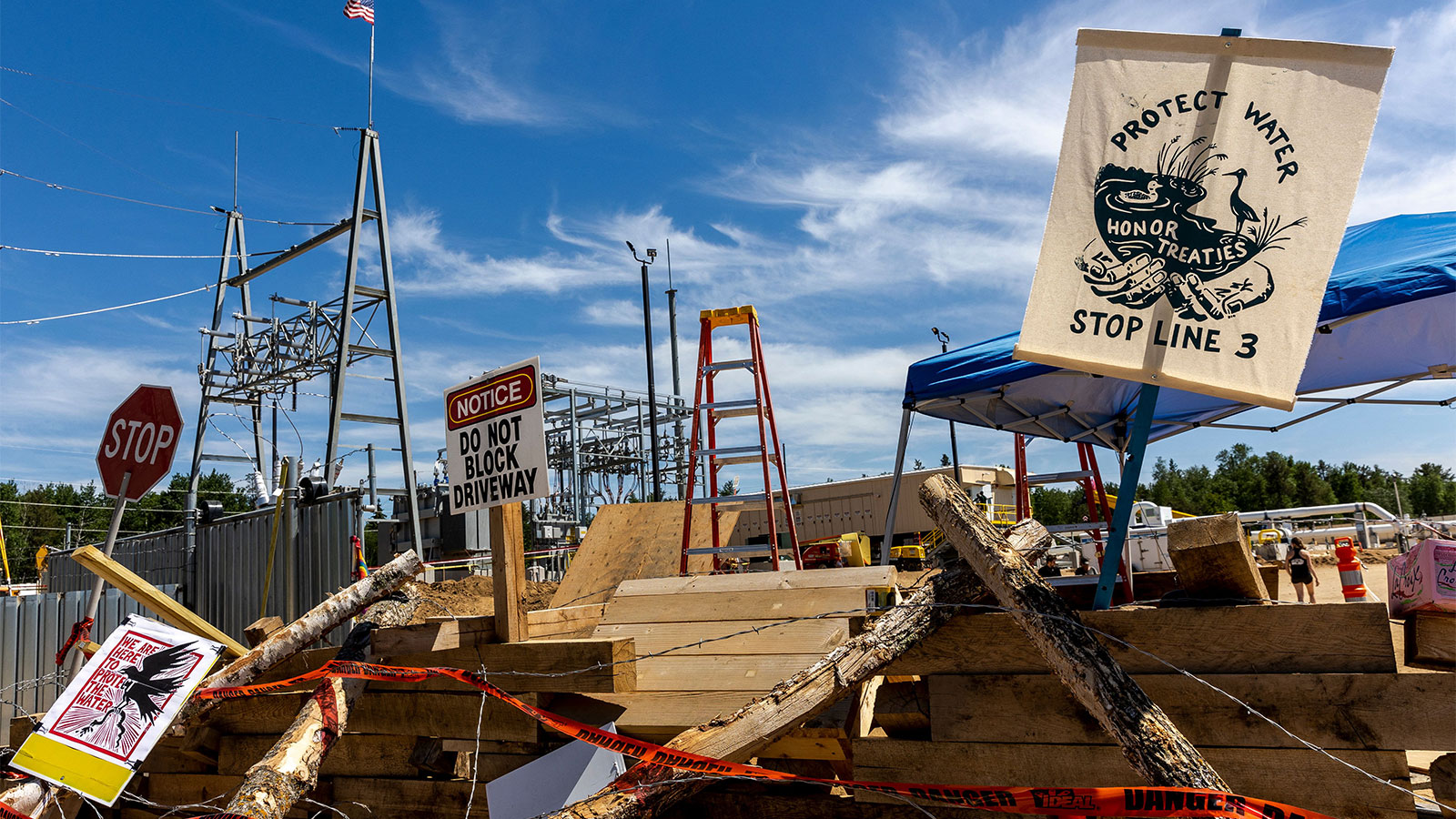An energy security bill passed by the U.S. House of Representatives last month has alarmed some environmental and Indigenous activists who say the legislation could fund states’ efforts to stifle protest against pipelines and other fossil fuel infrastructure. The bill’s opponents, which include the left-wing lawmakers of the so-called Squad, have said it complements the controversial “critical infrastructure” laws enacted in over a dozen states since the 2016 protests against the Dakota Access pipeline. Though the bill’s primary stated purpose is to incentivize states to engage in thorough emergency planning, its requirement that participating states coordinate with “energy providers from the private sector” has emerged as its most controversial provision.
The bill, known as HR 1374, provides financial assistance through the Department of Energy’s State Energy Program to help states formulate plans to secure energy infrastructure against “all physical and cybersecurity threats.” Sponsored by Democratic Representative Bobby Rush of Illinois, the bill passed the House of Representatives with broad bipartisan support by a vote of 398-21 on June 22, despite opposition from high-profile representatives on both sides of the aisle. It has not yet been introduced in the Senate.
Backers of the bill say it will help states protect essential resources against cyberattacks (like the recent Colonial Pipeline hack) and natural disasters, and they strongly deny any intention to target protesters. However, its opponents argue that encouraging states to counter unspecified physical threats could be read as an invitation to quell or even criminalize protests against fossil fuel pipelines, like those currently targeting construction of Enbridge’s Line 3 replacement pipeline in Minnesota.
Collin Rees, a campaigner at the environmental advocacy group Oil Change International, said the bill’s “overly broad language” provides “a blank check to do almost anything that a state wants to do and claim is even vaguely related to energy.”
Representative Cori Bush, a Missouri Democrat who voted against HR 1374, echoed Rees’ concern. “We cannot afford ambiguous language that allows space for state and local governments to further criminalize people protesting against environmental injustices,” she told Grist, apparently referring to the recent efforts of Republican-controlled states to use critical infrastructure laws to expand criminal penalties that can be used against protesters.

The bill’s proponents say these concerns are based on a misunderstanding of the capabilities HR 1374 grants states. David Terry, executive director of the National Association of State Energy Officials, or NASEO, a nonprofit which helped draft the bill, contended in a phone interview that there is no legal pathway for states to use the funding provided through the bill to target protesters.
Terry said that the bill encourages states to formalize plans for how to protect vulnerable communities, hospitals, and food supply chains in the event of an energy disruption. “What it says in broad terms is look at the hazards in your state — not protesters, that’s not a hazard — look at the natural disaster hazards, look at the cybersecurity hazards,” he told Grist. “How would you respond if your power was out, if your fuel was out?”
A number of states already have such plans in place, and Terry said this bill would “raise the bar for everybody” by encouraging states that have had little historical experience of natural disasters — but will likely see more of them due to climate change — to prepare adequately. NASEO has been advocating for this legislation for about four years, and last year a version of the same bill passed the House but faced opposition from the Trump administration; ultimately it was not introduced in the Senate. Earlier this year, the ransomware attack on the Colonial Pipeline, which supplies fuel to nearly half of the East Coast, gave the bill’s supporters a renewed sense of urgency.
James Tager, research director of the free speech advocacy group PEN America, said the controversy over what he sees as an ostensibly well-intentioned bill is best understood in the context of an ongoing state-level onslaught on protest rights, which has often been undertaken in the guise of protecting energy security.
“I certainly can accept the contention that this bill was written with zero intent to degrade the right to protest and protest-related rights, but we are at a political moment where we are seeing state after state attempt to restrict the right to protest in the context of protest against pipelines, in the name of protecting critical energy infrastructure,” said Tager, who co-authored a report last year documenting 116 bills restricting protest rights introduced in state legislatures since 2015. “So if I were an activist on this issue, I would indeed read this and say, ‘OK, this will incentivize states to consider new measures along those lines.’”
To Tara Houska, a prominent Indigenous activist and founder of the Giniw Collective, a pipeline resistance group, the provision mandating coordination with private energy providers seemed to indicate federal support for partnerships between oil companies and law enforcement, such as that undertaken by the Canadian multinational Enbridge, which has funded Minnesota law enforcement agencies to cover the costs of policing demonstrations against its Line 3 pipeline route. (Editor’s note: Houska was selected as Grist 50 Fixer in 2017.)
Houska, who is also a tribal attorney, said the passage of this bill would “create a legal basis for states to start entering into financial relationships with foreign or corporate actors who have none of the public’s interest in mind.”
She is no stranger to the consequences of such privately-funded policing: The driveway leading to her private residence, on which she hosts a pipeline resistance camp, was blockaded last month by her county’s sheriff, who has drawn from the escrow account Enbridge provided for Minnesota police. On Friday, a Minnesota court ordered police to end the blockade and granted Houska and other pipeline opponents a restraining order against the sheriff.
Terry, the NASEO director, defended the requirement that states consult with energy providers in drafting security plans as a commonsense measure — and even a redundant one, given the longstanding existing partnerships between state authorities and energy companies.
In Tager’s view, the disagreement over whether HR 1374 could be used against protesters reflects the fact that “it’s difficult to write such a bill in a way that forecloses the possibility that state-level actors will be able to use it in ways that advance the war on protest rights.”
“This demonstrates some of the harms that the assault on our rights creates — that it actually makes it more difficult for leaders who are concerned about threats like hurricanes, or threats of foreign hacking, to create policies that protect us against such threats, while at the same time ensuring that our rights are safeguarded,” Tager added.
The bill moved through Congress quietly, in part due to its introduction under “suspension of the rules,” a procedure that allows for the quick passage of ostensibly uncontroversial bills without a recorded vote. Only late in the process did some progressives flag that the bill might present concerns for pipeline protesters; Representative Bush’s staff marshaled the Squad and other progressives to demand a recorded vote on the day of the bill’s passage. Their opposition blindsided NASEO and the bill’s backers in Congress, who had not heard any of these critiques brought up during the legislative process.
Nine of the 21 votes against the bill were cast by Republicans, for reasons that remain largely unclear. Representative Chip Roy of Texas told Grist that the bill would waste federal funding and could support “misguided Green New Deal-style programs.” None of the bill’s other Republican opponents responded to Grist’s requests for comment.
“States should be solely responsible for developing and implementing energy security plans if they so choose,” Roy added.
Representative Bush, for her part, defended her opposition to the bill as a precautionary measure to protect civil rights and advance environmental justice: “As lawmakers, we must legislate intentionally to protect every community from environmental harm, and we must speak up when legislation falls short of our values.”




